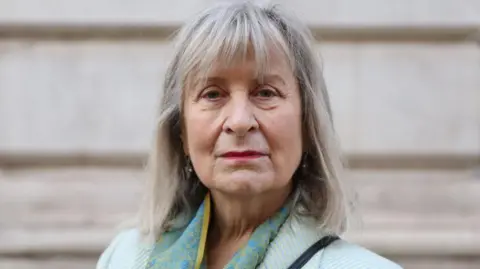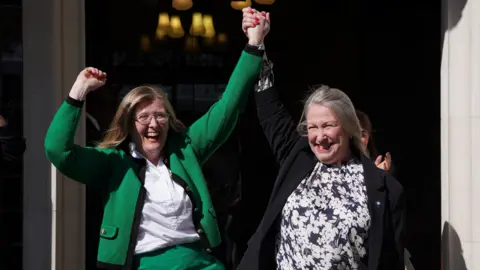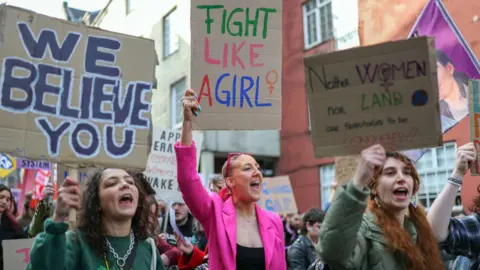Dropping misogyny law is sign of wider retreat - Baroness
 Getty Images
Getty ImagesThe Scottish government's shelving of a new law to criminalise misogyny is a part of a wider retreat in the face of "anti-woke" sentiment, a leading lawyer says.
Baroness Helena Kennedy KC led an independent expert group that called for new criminal offences directly targeting prejudice and contempt for women.
But Ministers say there is not enough time to draw up the new law before the 2026 Holyrood election, following the recent Supreme Court judgement on the definition of a woman.
Baroness Kennedy told BBC Scotland News: "I think the Scottish government thinks this is going to be too much of a headache."
She said the misogyny bill had been about treating women with respect, dignity and as people entitled to "the same equality and safety in the streets as men".
However, she accepted the government would want to reflect on the Supreme Court ruling which she said had created some uncertainty.
Former first minister Nicola Sturgeon had committed to the introduction of the bill on the recommendation of a working group chaired by Baroness Kennedy.
The proposals included new offences such as stirring up hatred against women and misogynistic harassment.
Such prejudice would also have been treated as an aggravating factor that could lead to tougher sentencing.
On Friday, ministers announced there was not enough time to draw up the complex legislation after the recent Supreme Court ruling that a woman is defined by biological sex under equality law.
Instead, the Scottish government will amend existing hate crime legislation in September, to make sex a protected characteristic.
 PA Media
PA MediaSpeaking to BBC Scotland's Drivetime, Baroness Kennedy said she was disappointed but not surprised by the decision.
"We are seeing a retreat from some of these areas that are being characterised as 'woke'," she said.
She said actions to address harassment and violence against women, and other groups facing discrimination were increasingly perceived as political correctness.
"I think the Scottish government just thinks this is going to be too much of a headache," she said.
She said including assaults against trans women into a new misogyny law would now require "a rethink".
Earlier, John Swinney said his government was committed to ensuring people were protected for misogynistic abuse.
But the first minister said it was navigating issues arising from the Supreme Court ruling, and the quickest way to do this now was to amend hate crime law.
"What action we can take is action we can take during this parliamentary term to tackle misogyny and that's what the government will do," he said.
 Getty Images
Getty ImagesThe Scottish government under Nicola Sturgeon had previously rejected that approach.
They instead asked Baroness Kennedy's expert group to examine whether gaps in the law required separate legislation.
Scottish Conservative deputy leader Rachael Hamilton MSP said the misogyny bill was the latest in a "litany of paused, ditched or botched" policies from Sturgeon's time as first minister.
Scottish Labour described it as a "screeching U-turn" and a "shameful broken promise" while the Scottish Lib Dems said it was a mistake.
Ministers are also shelving plans for a bill to ban "conversion therapy" for sexual orientation or gender identity.
Instead they are urging the Labour government at Westminster to legislate for England, Scotland and Wales on the issue - but if this does not happen, has promised to legislate within a year of the SNP forming a government after the Holyrood vote.
BIlls on misogyny and conversion therapy were both part of the Bute House Agreement with the Scottish Greens which ended in April 2024.
The party's equalities spokesperson Maggie Chapman said the decision not to proceed with them in the current parliament was a "shameful backward step".
